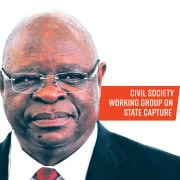|
Getting your Trinity Audio player ready...
|
By Natalie Keetsi
First posted on the Global Anticorruption Blog
South Africa has laws which criminalise various forms of corruption (bribery, embezzlement, and the like), yet officeholders have regularly exploited their positions of power for illicit gains.
Part of the reason for this is that it often can be very difficult to prove the elements of a specific corruption offence, even when it seems clear that the officeholder abused his or her authority. To address this problem, a prominent judicial commission in South Africa (known as the Zondo Commission) recently recommended that South Africa adopt a statutory criminal offence for the “abuse of public power.”
The recommendation was made in the second part of the report, which dealt with Denel. “It is therefore recommended that the Government give consideration to the creation of a statutory offence rendering it a criminal offence for any person vested with public power to abuse public power vested in that person by intentionally using that power otherwise than in good faith for a proper purpose.
“Such a statutory offence would therefore require considerable sentencing powers.”
The proposed offence would cover “any person who exercises or purports to exercise any public power vested in such person…otherwise than in good faith and for the purpose for which such power was conferred,” and if the prosecution can prove such abuse of public power, then the defendant can be subject to up to 20 years’ imprisonment and/or a maximum fine of R200-million.
Broad framing could be a problem
If the offence sounds very broad, that’s because it is. The Zondo Commission’s proposal contemplates a low threshold for what would constitute an abuse of public power, with no restriction to officials of senior rank. To illustrate, the Zondo Commission offered a wide range of potential examples of “abuse of public power,” including not only conduct such as the president granting an unauthorised person access to the “national wealth,” but also conduct like a junior official who suspends a colleague due to “envy or revenge”.
Such a broad framing, however, could be problematic. For one thing, it risks inundating already overburdened law enforcement agencies and courts. This, in turn, can cause backlogs and delays, which may further undermine public confidence in the justice system, especially if it seems taxpayer funds and other public resources are being wasted on criminal prosecutions of inconsequential abuses that could be dealt with administratively.
Furthermore, threatening public servants with harsh criminal penalties if they make any misstep that is judged after the fact to be an “abuse” risks unduly constraining officeholders in the proper performance of their duties and dissuading individuals from seeking careers in public service. Additionally, the ease of bringing, and winning, convictions for such a broadly and vaguely defined offence risks biased or politicised charges and prosecutions.
This is not to say that South Africa should reject the idea of creating a criminal offence of “abuse of public power”. But the Zondo Commission’s proposal can and should be modified to make it more appropriately targeted.
A useful model for South Africa might be a similar statutory offence that the Law Commission of England and Wales (an independent statutory body on law reform) proposed to the UK Parliament and the Ministry of Justice.
The Law Commission recommended the creation of a statutory criminal offence of “misconduct in public office”, which would replace the UK’s existing common law misconduct in public office offence. The proposed statutory offence would be more precise and targeted, and would more narrowly define “misconduct in public office” as entailing both “corruption in public office” and “breach of duty in public office”.
Corruption in public office, in turn, would require the public officeholder to knowingly use his or her public position or power for the purpose of achieving a benefit or detriment, and that a reasonable person would find the behaviour seriously improper. The Law Commission also recommended that the statute or the explanatory notes to the offence, as applicable, should: identify who would be regarded as a public officeholder under the statutory offence, define what ought to be considered a benefit or detriment, and describe the factors that a jury should be directed to consider in determining whether the officeholder’s conduct was “seriously improper”.
Game changer
South Africa may well adopt some form of abuse of public power offence. President Cyril Ramaphosa declared that he would respond to the Zondo Commission’s recommendation, after careful study of the matter. “The Department of Justice and Constitutional Development will research possible legislative provisions for the creation of a statutory offence for the abuse of public power. This work will be finalised by December 2023.”
This includes research into the approach taken by other jurisdictions, a comparative analysis that is most welcome, because the Law Commission’s proposal would likely serve as a better model for South Africa to follow.
The Law Commission has the right idea in crafting a statutory offence that is targeted at serious and blameworthy abuses of public office, and South Africa should consider following this approach as well, appropriately adapting models developed in the UK or elsewhere to the particularities of the South African context.
A statutory criminal offence for the “abuse of public power” would be a potential game changer in South Africa’s legal framework and its anti-corruption efforts, but it is important to get it right.

Natalie Keetsi is a Harvard South Africa Fellow, currently pursuing her Master of Laws degree (LL.M.) at Harvard Law School. She is an admitted attorney in South Africa, and holds a Bachelor of Laws degree (LLB) from the University of the Witwatersrand.
Image: Harvard University Center for African Studies








